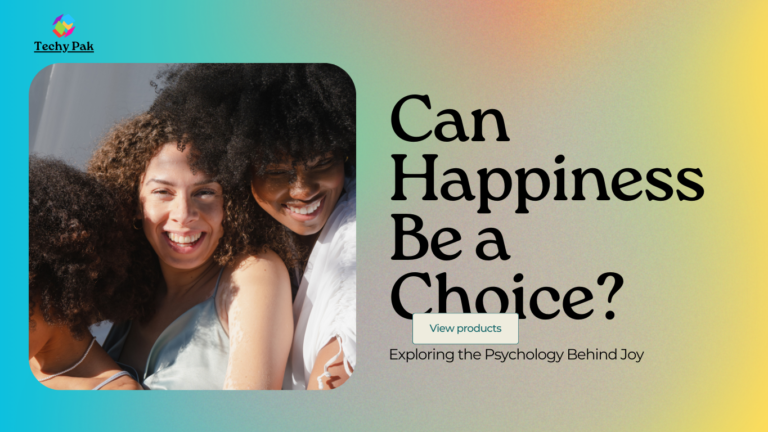Can Happiness Be a Choice? Exploring the Psychology Behind Joy
Can Happiness Be a Choice? Exploring the Psychology Behind Joy
People chase it through career achievements, relationships, and material possessions, only to find that these pursuits often fall short of delivering lasting joy. This paradox raises a compelling question: Can happiness be a choice? Grounded in psychological research and practical strategies, this article explores how shifting your perspective can make happiness more accessible than you might think.
Happiness: Circumstance or Perspective?
The age-old debate about what drives happiness often boils down to two camps: circumstances versus mindset. Many believe that external conditions—such as wealth, status, and relationships—are the main determinants of happiness. While these factors play a role, research in positive psychology suggests that our internal state, specifically our perspective, carries more weight.
Positive Psychology
By shifting the lens toward positive emotions, resilience, and meaningful living, this field has become a cornerstone in understanding well-being and fostering mental health.
Benefits of Positive Psychology
- Boosting Mental and Physical Health
Practices such as savoring joyful moments, meditating, and setting meaningful goals can reduce symptoms of anxiety and depression. - Strengthening Relationships
One of the pillars of positive psychology is fostering healthy relationships. By encouraging practices such as active listening, expressing appreciation, and nurturing empathy, individuals can build deeper, more fulfilling connections. Strong social bonds not only enhance emotional well-being but also act as a buffer against loneliness and social isolation. - Improving Workplace Productivity
Organizations have increasingly adopted positive psychology principles to create thriving workplace cultures.
Practical Applications of Positive Psychology
The principles of positive psychology are versatile and can be applied across various domains:
- Education: Schools that integrate positive psychology strategies, such as growth mindset training and resilience-building exercises, report improved student well-being and academic outcomes.
- Healthcare: Mental health practitioners use interventions like gratitude exercises and cognitive-behavioral techniques to help patients build positive coping strategies.
- Community Development: Programs focused on cultivating communal strengths, such as trust and cooperation, foster inclusive and supportive environments.
Criticisms and Challenges
While positive psychology has made significant strides, it is not without criticism. Some argue that its emphasis on positivity can overlook systemic issues or marginalize individuals dealing with severe adversity. Moreover, the pressure to “always look on the bright side” may lead to toxic positivity, where negative emotions are dismissed rather than addressed.
Conclusion
The role of positive psychology in enhancing well-being is undeniable. By shifting the focus from merely surviving to thriving, this field offers transformative tools for individuals and societies alike. When applied thoughtfully and inclusively, positive psychology has the potential to cultivate resilience, foster meaningful relationships, and inspire a greater sense of purpose in life. Its principles remind us that while challenges are inevitable, our capacity to flourish lies in the strengths we nurture and the connections we build.
The Science of Choosing Happiness
If happiness is a choice, what does that choice look like in practice? Psychology offers several evidence-based strategies that highlight the importance of perspective.
By grounding ourselves in the now, we can let go of past regrets and future anxieties that often hinder happiness.
Research by Dr. Jon Kabat-Zinn, a pioneer in mindfulness-based stress reduction (MBSR), has shown that mindfulness practices can reduce stress and improve overall well-being.
- Building Strong Relationships
Human connection is essential for happiness.
Choosing happiness often means prioritizing meaningful connections over superficial ones.
- Setting and Pursuing Meaningful Goals
The pursuit of meaningful goals gives life direction and satisfaction.
When setting goals, it’s important to focus on intrinsic motivations—things that genuinely resonate with your values—rather than external rewards like money or recognition.
Dr. Richard Davidson, a neuroscientist specializing in emotion, highlights that intentional mental practices can change the brain’s structure over time, making happiness a more habitual state.
Challenges to Choosing Happiness
While the idea of choosing happiness is empowering, it’s important to acknowledge the challenges. In such cases, professional help—whether through therapy, medication, or support groups—can be invaluable.
Additionally, societal pressures and systemic issues can impact individual happiness. While perspective plays a significant role, broader changes are also necessary to create environments where people can thrive.
Conclusion: Happiness as a Journey
So, can happiness be a choice? The answer lies in the interplay between perspective and circumstances. By cultivating a happiness mindset through practices like gratitude, mindfulness, and meaningful connection, we can create a more joyful and fulfilling life.
By making intentional choices every day, we can transform happiness from an elusive goal into a lived reality.

